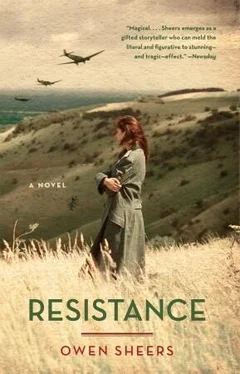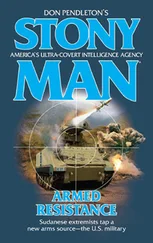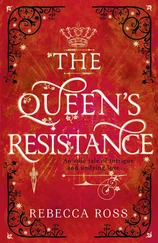Not everyone had been able to give the lieutenant as good a reason as George, and fifteen other men from the area were taken away that day. They never came back. The lieutenant made sure everyone knew it would be the women and children next, the old men, the grandmothers. That next time it would happen here, in their homes and in their fields, not at the end of a journey in a truck.
Since then any news of operational units’ activity came from far away. Attacks on the railway up towards Hereford, a munitions dump exploded outside Abergavenny. A new newspaper, the Star , distributed by the Germans to replace the papers that had stopped production in the weeks before their arrival, ran reports of these attacks. A vicious insurgency was determined to undermine the freeing of the British people. Funded by self-interested parties, these insurgents were attempting to destabilise the peaceful German occupation. Germany’s war was not against the British people, but against Churchill’s tyrannical democracy, which had insisted on prolonging this conflict for five unnecessary years. The insurgency was the last, sputtering breath of this dying tyranny. The German army would, however, prevail. As they always did. Long live the Führer. Long live the Reich.
After the killing of the guards at the station, the western edition of the Star had run just one other article about the area. The editors, whoever they were, had chosen to give this article more than the usual amount of space. “Insurgents Murder Local Police Constable.” George wished the headline was just another of the many lies the paper printed every week, but this time he knew it was true. Constable Evans had been shot through the window of his own house as he sat down to a cup of tea before bed. A single bullet, fired from long range. The Star said it was the work of the insurgents, but no one believed that. Except George, for two reasons. First, because Atkins had told him this would happen, that he shouldn’t be alarmed when it did. That it would be necessary. Second, because the calibre and model of the rifle the Star said was used in the killing of Constable Evans was identical to that of the sniper’s rifle George had, just the other night, taken from beneath his bed and buried deep in the manure heap piled in the corner of his father’s farmyard.
George shifted his head slightly, trying to ease the pressure of a thorn pressing behind his ear. The soldiers were still milling around the idling truck in the middle of the lane. Its headlamps burnt into the hedge, casting a broken glow across the field beyond. The chassis shook gently over its engine and the exhaust fumes turned slowly in the cold air. He thought there were six of them, though he couldn’t be sure. He saw them only when they passed through or near the beams of the headlamps, or when they caught one another’s faces with their torch beams. Ghosts, half-men appearing out of the darkness, hovering above invisible legs. Headless men, the buttons and webbing of their chests illuminated beneath faces and helmets eaten by the night. The cigarettes gave him more of an idea. Five of them now, their tips making slow loops in the air, glowing on and off, rising and falling like amber fireflies. George counted them down as they extinguished. Five, four, three, two. The last one burnt faintly all the way to the truck, hung suspended in the air outside its window, glowed brightly once more, then went spinning to the ground, dying in a little explosion of sparks. Shortly afterwards the truck shuddered down its spine, a grating gear engaged, and the vehicle began turning. Three of them were going, three were staying. If he timed it correctly he could use the noise and the cover of the truck to run along the hedge and slip over the gate further up the lane. He wouldn’t be going any further tonight. Not this way at least. He’d find another way. Because there was always another way, that’s what Atkins had told him. “Always another way, George,” he’d said, his hand on his shoulder. “You’ve just got to keep your eyes open, that’s all, lad. Keep your eyes open.”
His eyes wouldn’t open. They seemed glued shut. With his own blood? No, not blood. It was a bandage. A tight bandage pressing down on his lids. But there was blood, yes. Dried. He could feel it, pulling on his skin.
Atkins moved his head. Everything spun inside him. White snow under his closed eyes.
His hands were tied. And his feet. Yes, he remembered now. Stupid. Stupid to be caught like that. He should have gone north with the rest. Regrouped. But someone had to stay, didn’t they? Stay behind.
Who told? Who sent them to him? No one perhaps. But yes, always someone. Not their fault. What about him? What had he said? No, nothing. Nothing. Yet.
There’d been no time for the pill. They’d taken him by surprise. He tightened his hands so the base of his fingers touched. Yes, the ring was gone.
Stupid to be caught like that. Should have kept his eyes open.
What was that? A door opening. Closing. The click of a latch. Footsteps. They were coming for him again. He listened to their approach. A small room. They came close. He could hear their breathing, smell the fresh smoke on their clothes. Two of them. Why didn’t they speak?
One set of footsteps now, moving behind him, then hands, hands at the back of his head. Fingers at the back of his head. The bandage coming off, pulling at his eyelashes, peeling the blood from his skin — Oh Christ! Jesus Christ! Burning light. Burning, burning light. Hands at his face now, fingers pulling at his face, holding his head, thick fingers over his eyebrows, thumbs pulling at his lids, drawing them back, keeping his eyes open.
The snow came to the valley the same way the men had left it: suddenly, silently, and overnight. When Sarah pulled back her curtains the next morning, the day was still half dark, washed out in greys and blues. The only light shining into the room was from an undulating seam of white pressed against the lower panes of the window; a miniature range of bright hills, their contours bisected by the glass. She looked at it, her eyes still grainy with sleep, confused. There had been no warning, no sign this would happen. On going to bed she’d been able to see the stars, but now the sky and the world beneath it were obscured. There was a wind too, wild about the house. She looked out at the branches of the trees. She could just see them, black behind the still-falling snow. Yesterday they’d been upright, motionless, but now they were all swept the same way, like iron filings drawn to a magnet, bowing under the wind that pressed upon them.
The day was no lighter by the time Sarah was out in the yard, clumsy and heavy under layers of jackets and coats, a woollen scarf wrapped about her head, a sack over her shoulders. She fumbled with the dogs’ chains, her fingers thick under gloves. Taking Tom’s crook and a spade from the shed, she began walking down to the lower field where she and Maggie had herded the lambing ewes just weeks before. She was walking against the wind. The snow caught in her eyelashes, melting her vision. With each step her leg sunk up to the knee. When she pulled her boots back out again, she tinged her own footprints with red brown mud, like the edging of blood around a punctured bandage. The world had turned white, the twigs of the hedges fleshed out with inches of snow balanced along their upper sides. With every step forwards she had to push herself against the crook, up and on, walking within her own sphere of mist, the rest of the valley extinguished. The dogs went before her, leaping through the snow like salmon against the current of a stream. Despite the wind Sarah was soon sweating under her heavy clothes. Her breath came hard and fast as she cursed Tom for leaving her like this, quietly at first but then louder, letting the wind snatch the damning of her husband from her mouth.
Читать дальше












